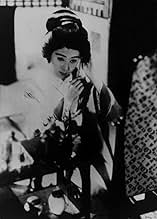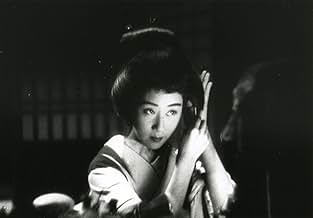IMDb-BEWERTUNG
7,4/10
3174
IHRE BEWERTUNG
Zwei Geisha-Schwestern führen ein hartes Leben in Kyoto: Nachdem sich eine von ihnen verpflichtet fühlt, einen bankrotten Geschäftsmann zu unterstützen, richtet die andere Schwester verschie... Alles lesenZwei Geisha-Schwestern führen ein hartes Leben in Kyoto: Nachdem sich eine von ihnen verpflichtet fühlt, einen bankrotten Geschäftsmann zu unterstützen, richtet die andere Schwester verschiedene Programme ein, um ihn loszuwerden.Zwei Geisha-Schwestern führen ein hartes Leben in Kyoto: Nachdem sich eine von ihnen verpflichtet fühlt, einen bankrotten Geschäftsmann zu unterstützen, richtet die andere Schwester verschiedene Programme ein, um ihn loszuwerden.
- Regie
- Drehbuch
- Hauptbesetzung
- Auszeichnungen
- 1 wins total
Namiko Kawashima
- Oemi Furusawa
- (as Kazuko Kuno)
Fumio Ôkura
- Jurakudo, the antiques dealer
- (as Fumio Okura)
Empfohlene Bewertungen
In the early days of film writing "Sisters" was often cited as one of the great films EVER; it is probably right that this quiet, measured film is now not viewed as such.
Still, I found it held my interest easily and was effecting. The acting is admirable, and the sadness of the women's plight are expressed without sentiment. Well worth seeing; 8 out of 10.
Still, I found it held my interest easily and was effecting. The acting is admirable, and the sadness of the women's plight are expressed without sentiment. Well worth seeing; 8 out of 10.
Mizoguchi creates a tiny universe with a few characters that somehow manages to maintain in balance throughout the entire film. This is achieved because every character feels real, that means they can be right and wrong and there is not a single character that has the absolute truth.
Very simple filmmaking precisely thought out. With no ostentation the director decides to stay in the shade and put the story and characters in the spotlight.
After watching It on DVD a couple of years ago, I got to see It on the big screen thanks to the Bilbao Art House Zinema.
After watching It on DVD a couple of years ago, I got to see It on the big screen thanks to the Bilbao Art House Zinema.
This movie, about two geisha sisters who lead a hard life in the Gion district of Kyoto, is a good drama movie!
I personally do not have much to say about it. The movie is not amazing or incredible for my part, but it has some funny moments where the main plot is the most compelling element. It feels slow at times, but fortunately, it is quite short to be a feature film, and it is also nicely shot and the actors do good. I am glad I took it a visit because I had a good time!
Despite not being a masterpiece, this movie is a good drama with humor and a strong plot. Solid acting and visuals make it worth a watch.
I personally do not have much to say about it. The movie is not amazing or incredible for my part, but it has some funny moments where the main plot is the most compelling element. It feels slow at times, but fortunately, it is quite short to be a feature film, and it is also nicely shot and the actors do good. I am glad I took it a visit because I had a good time!
Despite not being a masterpiece, this movie is a good drama with humor and a strong plot. Solid acting and visuals make it worth a watch.
Umekichi, a geisha in the Gion district of Kyoto, feels obliged to help her lover Furusawa when he asks to stay with her after becoming bankrupt and leaving his wife. However her younger sister Omocha tells her she is wasting her time and money on a loser.
Here we have another film by Mizogucki looking at "fallen women", much like "Street of Shame" twenty years later, and to some degree "Osaka Elegy". But we also have a tale of the old and the new -- looking to the West and also sticking with tradition. This is especially interesting given the radical shift in Japanese culture after World War II.
I have not seen the remake and thus cannot compare them, but how do you top the work of Mizoguchi? You simply cannot.
Here we have another film by Mizogucki looking at "fallen women", much like "Street of Shame" twenty years later, and to some degree "Osaka Elegy". But we also have a tale of the old and the new -- looking to the West and also sticking with tradition. This is especially interesting given the radical shift in Japanese culture after World War II.
I have not seen the remake and thus cannot compare them, but how do you top the work of Mizoguchi? You simply cannot.
I'm surprised by the fact that Mizoguchi was doing this kind of filmmaking and a strong criticism on geisha's lives in those years already. It must have been really innovative at the time and, for the same reason, it might probably not have been appreciated by most of the audience. I find it ironic because now it has aged considerably, that it is also hard to appreciate by today's standards. In order to fully comprehend its content, one would have to watch it with an open mind and submerge into its time. Also, the print quality might not be good, which is yet another obstacle that may keep viewers from appreciating the film as well. Fortunately, I was able to get hold of a high quality print, and it is also a great privilege to behold Mizoguchi's filmmaking techniques; I for one consider them to be of great importance in cinema history.
The story concerns two geisha sisters who live in a neighborhood known as Gion, in Kyoto. They are very different from each other; one side is influenced by a more modernized mindset, whilst the other is still rooted in traditional manners. This existing contrast will slowly unravel as the film goes on.
Technically, the film is outstanding for its time. We have that riveting tracking shot at the beginning of the film that thoroughly advances through the house of the patron of one of our two protagonists. Subsequently, you'll find yourself immersed in the many sequence shots the film is divided in.
If you're fond of Japanese cinema, you should definitely watch this forgotten gem.
My score: 8.8/10
The story concerns two geisha sisters who live in a neighborhood known as Gion, in Kyoto. They are very different from each other; one side is influenced by a more modernized mindset, whilst the other is still rooted in traditional manners. This existing contrast will slowly unravel as the film goes on.
Technically, the film is outstanding for its time. We have that riveting tracking shot at the beginning of the film that thoroughly advances through the house of the patron of one of our two protagonists. Subsequently, you'll find yourself immersed in the many sequence shots the film is divided in.
If you're fond of Japanese cinema, you should definitely watch this forgotten gem.
My score: 8.8/10
Wusstest du schon
- WissenswertesDaiichi Studio went into bankruptcy following the poor commercial results of the film.
- VerbindungenReferenced in Aru eiga-kantoku no shôgai (1975)
Top-Auswahl
Melde dich zum Bewerten an und greife auf die Watchlist für personalisierte Empfehlungen zu.
Details
- Erscheinungsdatum
- Herkunftsland
- Sprache
- Auch bekannt als
- Sisters of the Gion
- Produktionsfirma
- Weitere beteiligte Unternehmen bei IMDbPro anzeigen
Box Office
- Weltweiter Bruttoertrag
- 17.807 $
- Laufzeit
- 1 Std. 9 Min.(69 min)
- Farbe
- Seitenverhältnis
- 1.37 : 1
Zu dieser Seite beitragen
Bearbeitung vorschlagen oder fehlenden Inhalt hinzufügen




















